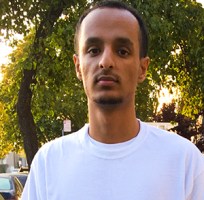 A guest post by Edrees Saied, an Oakland public school graduate and Energy Convertor.
A guest post by Edrees Saied, an Oakland public school graduate and Energy Convertor.
I can hardly survive identifying as a Muslim in society. But I’m slowly learning how to reconcile my identity as I grow older.
In the past, I’ve often felt self-alienated as I internalized all the stereotypes and criticism about Muslims, and Arabians in general. At some points, I didn’t even want to mention my true identity. Thinking that if I do, I would be treated differently.
Forced Into a War
I don’t know why, but it feels like I’ve been forced into a war in which I don’t belong. A war between Islam and every other religion. Whenever Islam is referred to in class, it is always associated with war and terror.
I remember talking about ISIS and al Qaeda with some of my friends during junior year. I told them that faith in a religion is never an excuse to kill or demonize another human being. But they all insisted that “Islam devalues women” and that the religion itself represented corruption.
I couldn’t help but feel betrayed.
Betrayed by the school for not teaching its students the difference between terrorism and Islam. The huge difference between what terrorist groups claim and what their actions represent. Betrayed by these strangers whom I once called friends. Betrayed by society itself for being consumed by its fears of what it cannot understand.
But it isn’t always like this.
Some of my teachers have accepted my Muslim identity. They would understand and respect my fast for Ramadan, or how I would be absent at school because of Eid (a religious holiday). I have also found adults around OUSD (Oakland Unified School District) that help me amplify my voice, and appreciate myself for who I am.
OUSD hosted the event, “Yemen: Global to Local to Household,” in which I united with other Muslims in my community.
The Questions We Need to Ask in School
Still, I want my school as a whole to address critical questions like, “Is it religion, or ignorance and fear, that corrupts society?” Or questions like, “Can humanity avoid responsibility for its crimes, and blame its murdering on faith in God?” School should teach you how to become aware of the world around you, not how to resent innocent people for crimes they did not commit. It is the answers to crucial questions like these that may spread unity or division at my school.
But, no matter what society or what other people at school think of me, I refuse to let stereotypes define who I am. I refuse to conform to societal expectations. I refuse to allow oppression to control how I feel about myself. I am solely responsible for my existence and my actions. No one can take that away from me.
With that, I am confronting any pressures I face head on. As I connect with more and more people at school, I am learning how to own every aspect of myself.

